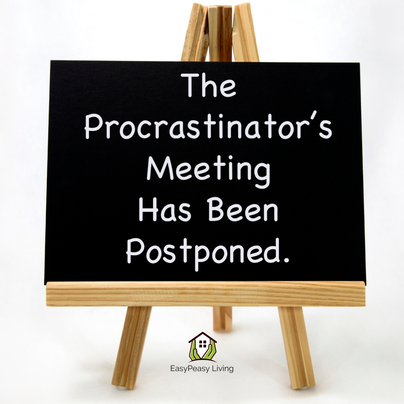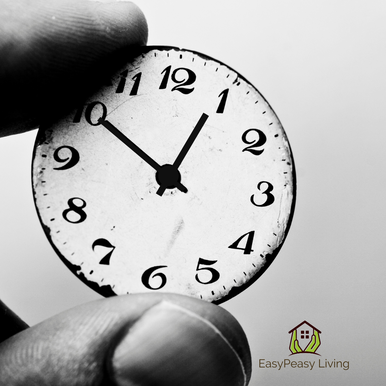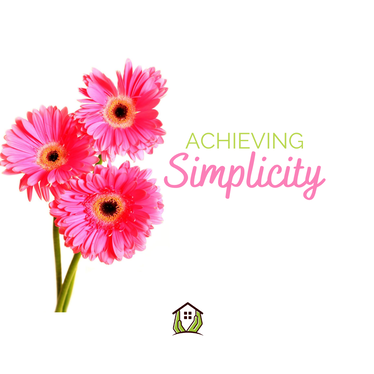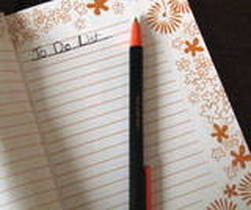 “The gentleman at the next table has ordered you a large portion of unpleasantness. How would you like that served?” “I’ll have it procrastination-style, please.” “Ok, so on a bed of dread with a side of guilt then... served cold?” If you really want to savor the bitter taste of tasks you wish you could avoid, procrastinate. Sounds yummy, no? Then take action to get them off your plate as soon as possible. The only thing worse than being faced with something you dread doing is prolonging the experience and adding to it feelings of guilt, inadequacy, stress and anxiety. But first, it’s worth asking yourself why you are procrastinating in the first place in order to figure out how to stop doing it. There are many reasons you might put off doing things: 1. You find them unpleasant. Figure out how to make them more pleasant, or at least less unpleasant. Work with a friend, listen to music while you work, make a game out of it, plan a reward for afterward, or break it into smaller, more manageable chunks. 2. You would rather do something else. The quicker you get your task done, the sooner you get to focus on the things you enjoy. Not only that, you’ll actually revel in those activities more when you aren’t encumbered by a sense of dread and/or guilt at not tackling your unpleasant task first. By getting the awfulness out of the way, you won’t have to worry about having adequate time to complete it properly. 3. You think if you wait long enough you might not have to do them. This might be correct, but if that turns out to be incorrect, the delay will shorten the time you have available to do it. This will increase your stress level and likely yield substandard results. 4. You aren't sure how to do them. Your first step should be finding the information you need. See this experience as a chance to learn something new and feel accomplished. When you change your attitude and approach it as an opportunity instead of as a chore, you are less likely to dread it. The next time you’re faced with a similar situation, you’ll feel more confident in your ability to meet the challenge. 5. You don't know where to start. Begin with a “preparation step”. Buy supplies you know you’ll need, line up help from a friend or family member, research some information, schedule an appointment, or ask someone else for advice on the best place to start. Once you take that first step, the next one will come easier. The worst thing that could happen is that you miss an important step and have to start over again. At least then you’ll know where to begin, right? And remember, not taking the first step will never get the job done. Where you start isn’t nearly as important as just starting somewhere. 6. You lack the resources you need. Whether you need money, information, assistance, or time, identify and create a plan for acquiring the resources you need. Even if this means you have to wait awhile until you have them in order to begin the task, you can still make progress just by working on obtaining them. 7. You’re afraid of what you might discover. Realize that uncovering a problem is always the first step in fixing it. If you’re avoiding a medical appointment, doing your taxes, or calling the plumber simply because you’re afraid your worst fears will be confirmed, putting it off won’t improve the situation. However, learning the truth sooner may. Perhaps your fears are unfounded (imagine the relief!), or maybe finding out about a problem now will mean fixing it before it gets even worse. At the very least, you’ll reduce your uncertainty and all the anxiety that comes with it. Side note: I'm not usually one to procrastinate...anymore, but when I do, it's almost always because of 4 or 7. It requires lots of self-awareness and conscious effort to avoid falling back into the old habit of putting things off under these circumstances. But I realized a long time ago that it's worth the effort in order to avoid the anxiety-laden aftertaste of my self-indulgence. Whatever your reason for it, procrastination definitely contributes to your level of stress and anxiety. The only remedy is action. Organization can help.
If you find yourself with a heaping plateful of tasks you’d rather avoid, season it with a generous blend of confidence, determination and just a sprinkle of organization, and then gobble it up before it gets cold. Don't miss out! Sign up to have each new EPL Blog post delivered to your inbox each week.
0 Comments
 You know those people who always seem to just have it all together? The ones who are usually calmly waiting, scrolling through Facebook, when you burst through the door feeling frazzled and out of breath because you're late meeting them...again!? The folks who have the PTA calendar memorized and always seem to have contact information right at their fingertips to meet every conceivable need, from trusty mechanic or top notch medical specialist to medieval jousting expert? They remember to return your book, even though you forgot you loaned it to them in the first place. They know when and where outdoor movie night is happening and exactly when to score free cones because it's National Ice Cream Day. They always acknowledge your birthday and never forget to send in non-perishables for the school's canned food drive (while you, on the other hand, can be found desperately hunting through your pantry at the last minute for cream of mushroom soup or something else you'll probably never eat). Yeah, we all know at least one of these people, but starting today, you can become one with much less effort than you think. New Habit #4: Take and Use Notes. Keep track of everything as it enters your brain...reminders, to-dos, shopping needs, contact info, events, appointments, due dates... in a central, reliable system and--here’s the key--review it daily. Why? The biggest benefit is the confidence and peace of mind you'll find from having a reliable way to tame your brain clutter. Yes...that's a thing...and too much of it leads to stress, whether you're consciously aware of it or it's just bubbling up right beneath the surface. That old expression "too many cooks in the kitchen spoil the broth" means that having no established leader to give clear direction will lead to chaos and, ultimately, failure. Well, that's what happens when you have competing priorities, demands on your time and random thoughts running wildly through your head without a central unified and reliable system in place for managing it all. Now, the key word here is "reliable". Lots of people have calendars, address books, fancy apps on their phones, colored-coded giant whiteboards on the refrigerator....you name it, yet still suffer from brain clutter because they aren't in the habit of actually maintaining and using these tools properly. All the fancy pots and top-of-the-line kitchen tools in the world won't make you a master chef unless you know how to use them and do. With proper daily maintenance and a solid habit of reviewing what you’ve noted, you'll avoid overbooking (and overstretching) yourself, missing important appointments or deadlines, or forgetting to do tasks, and you'll be able to plan ahead with confidence. You'll also rest easier knowing you can communicate with your network whenever and wherever needed. How? This is actually a three-part habit. First, choose a format that you think will work best for you, be it electronic, paper, cave drawing, whatever, or even a combination of the above elements. This will involve some trial/error and re-evaluation as you go. Expect that...it's okay, and if you have to change formats along the way, it just means you are learning more about yourself and what works for you (or doesn't). There is no right or wrong way...just a right-for-you or wrong-for-you way. Whatever format you choose, it must meet these three criteria:
Next, add anything and everything you need to remember into your system as soon as you become aware of it.
Finally, make a daily appointment with yourself to review the data in your system so that you can bring it to life through an action plan. This is crucial. Without this, your system will not work and you will no longer trust it...reliability is key, remember? Simply sitting down each and every day to review what is coming up so that you can prioritize, plan ahead and share info with others as needed will save you time and stress otherwise spent worrying about what you're forgetting. Having a centralized system for tracking everything not only enables you to address your immediate concerns but also keeps the back-burner items on your radar so they don’t sneak up on you. Alternative Option Already got this one down? Fabulous! Have you tamed your paper piles? Having a system in place for keeping track of appointments, reminders and contacts is a prerequisite to eliminating paper clutter. If you've already mastered Habit #4, go ahead and begin a daily triage of your incoming papers into these categories: action, file, pay, and read. Create calendar reminders/contacts for action and pay items, file reference papers and contacts regularly, and keep reading material handy and to a minimum (seriously, if you haven't read the fashion article you bookmarked in that 2010 magazine by now, it's probably safe to go ahead and toss it). Tip of the Week Speaking of taking notes, one way to improve your odds of adopting any new habit is to take note of what has (and hasn't) worked in the past. Was there a particular person who encouraged you (or sabotaged your efforts)? Is there a specific strategy that kept you motivated? Repeat the behaviors that have led to success and try to identify and eliminate the ones that led you astray. It’s still not too late to join the official Good Habits Challenge! From this point on, only those who have actually joined the challenge will receive weekly emails introducing the remaining six habits of organized people. Plus, those who join get some free tools to help in adopting any new habit (not just these ten) and are eligible for free accountability check-ins and a chance to win a prize at the end. Joining is FREE, so what have you got to lose? Email [email protected] if you have questions about the challenge, need more suggestions or encouragement, or just want to share your success story! You’ve got this! Don't miss out! Sign up to have each new EPL Blog post delivered to your inbox each week.
 People say it all the time…”Live in the now”...”Practice being more present”...”Hold the moment”. But what does all that actually mean? How do you live in the moment? Aren’t you supposed to remember the past and plan for the future? How can you do that if all you ever think about is the present? Isn’t ignoring the past and future just plain irresponsible? These are all very valid questions that make living in the present feel so challenging to a lot of people. Isn’t it supposed to be easier? Yes! And once you have the answers to these questions it will be. First of all, let’s begin answering what it all means by talking about what it doesn’t mean. Living in the present does not mean never thinking about the past or the future. After all, they are equally important components of your life. Reflecting on the past helps you learn lessons you then carry forward with you to help you better navigate the challenges you find here in the present. Planning for the future gives you a sense of hope and provides you with goals that inspire your actions now in the present and begin your evolution into an ever better version of yourself. Both are essential ingredients to living a happy life. But there is a big difference between thinking about the past or future and dwelling in them. The goal should be to use your thoughts about the past and future to help guide your actions in the present. It’s important to realize that action can only take place in the present. You cannot act in the past...you can only learn from the actions you once took. You cannot act in the future...you can only plan the actions you hope to take when you get there. Most of us have a natural tendency to spend way more time on reflecting and planning rather than we do on actually doing. Living in the present means flipping those proportions. It requires a continual, conscience decision in the present to change. That’s why it feels so hard sometimes. I don’t pretend to be past the hard part yet, but logic, experience and hope tell me that - just as with any other habit - living in the moment gets easier with practice. And guess what? Reflecting and planning are often solitary activities. If you want to connect more with the people around you, spend more time in the present. Try some of these actions, or start with just one and gradually add more over time:
We are all living through an era of great uncertainty, where longing for the past can be a futile and depressing exercise and planning for the future is virtually impossible without more information. There is no time like the present to start living more in the present. With a little practice and a new perspective, even holding the moment can be easy peasy.  If you're suffering from what I call "Covid Fog", you are not alone! Almost everyone I've talked to has experienced this phenomenon on some level during the past six months. Covid Fog is when you have difficulty sharpening your focus and/or maintaining it for as long as you used to before the Coronavirus pandemic shooed each of us into our respective corners of quarantine. Several factors contribute to creating Covid Fog: looser schedules, more frequent interruptions, lack of structure, changes in routine, mild depression, fatigue, boredom, grief, a dearth of motivation, and lapses in self-care are just some of them. Whatever the cause, the results can affect everything from your job performance to quality of life issues. Adopting strategies to help you find your focus is an essential first step in coping with the uncertainty that is 2020. Here are my top tips for finding and maintaining your focus:
With a little intention, perseverance, and these strategies, even finding your focus through the Covid Fog can be easy peasy.  Imagine standing in the bottom of a deep pit, looking up and wondering how you will ever get out! Actually, most of us don’t have to imagine that...we experience it every time we look at our long To-Do lists and bulging calendars (assuming you even have those...not having them is more like realizing you’re at the bottom of a deep well but being unable to even see the sky). It doesn’t take a rocket scientist to figure out that the only way out of a deep, dark pit of any kind is to climb out. You need a ladder, a rope, a staircase, or a lot of well-placed toe- and hand-holds. Then it’s just a matter of climbing one carefully-planned step at a time. Well, today I’m gonna teach you how to build yourself a staircase leading out of that pit of endless tasks, chores, projects and appointments that make up “adulting”. As with building any sturdy, reliable staircase, the first step is always to set aside planning and building time. Constructing it in a slap-dash-as-you-go fashion will leave you with nothing but a rickety pile of lumber that could give way at any time, sending you back down to the bottom of the pit with potential injuries. So, if you don’t already have a calendar, get one. It can be an app you use on your phone/tablet or a good old-fashioned paper day planner...whatever works for you. Add to it a weekly appointment with yourself, preferably at a consistent time and in a quiet location with limited interruptions so that you can focus. Do not blow off this appointment...EVER! I know, I know...you’re busy...things come up...the kids never give you any peace and quiet. Just remember: you are stuck in a pit! Nothing can be accomplished--for anyone--until you manage to pull yourself out of it. So finding a way out should be your #1 priority! During your first appointment, create a blueprint for your staircase by considering your hierarchy of life priorities. What’s at the top? Health and fitness? Time with family? Your career? Knowing exactly which side of the pit you want to emerge on will determine how you build your staircase, so it’s worth recording your hierarchy and referring back to it whenever you’re not sure how to prioritize. For more guidance on how to determine this, go back and read the Achieving Simplicity post from August 3, 2020. Next, you'll need to gather all your building materials. This involves brainstorming about everything you think you might need to do this week. Include errands, chores, phone calls/emails, research, work and home improvement projects, appointments, volunteer work, meals, and all other commitments and responsibilities. This step will become easier in time as you gain a sense of which materials (to-do items) you really don’t need for your staircase and build up a stockpile of the ones you use each and every week. Keep a running task list that you continually add to as you think of new things. Once you have a comprehensive list, identify the components you really don’t need and get them out of your way. In other words, delegate as many tasks as you reasonably can and eliminate or defer the optional things that don't align with your top priorities. (Here’s where that blueprint really comes in handy!) Where might you be able to relax your standards or expectations to make this climb a bit easier? What optional tasks can wait? By the way, relaxation time is not optional. While you may need to tweak how much of it you get from one week to the next, trying to make do without it is like building a staircase without any hardware. Eventually it will collapse under the pressure. Now you just need to order your steps. Fill out your calendar and daily tasks lists while answering these questions:
Once you’ve completed your staircase, you’re ready to start climbing. But first, don’t forget a daily safety check. Each morning, consult your plan, just as you would double-check the reliability of each step before placing all your weight on it. If you discover a weak or missing tread up ahead, don’t panic...just replace it. It’s a whole lot easier to tweak your staircase as you go through your week, than it is to try to climb out of that pit without one. Download our FREE Week-Ahead Planner to help you get started. The best news is that the more staircases you build, the better and quicker your construction becomes. With a well-drawn blueprint and the right tools, building a staircase to any solution can be easy peasy.  Today's adults are busier than ever…we are kids' chauffeurs, homework helpers, community volunteers, short order cooks, corporate slaves and marathon commuters. The demands on our time are never-ending. In a world of instant access, we keep trying to cram more and more into the same 24 hours. Then, we fill our homes with stuff we think will make life “easier”...time-saving gadgets in the kitchen, clever electronic devices in our pockets, anti-stress and anxiety medications in our cabinets. Our constant need to “keep up” with our friends and neighbors lures us into an endless quest for the latest fashions in clothing and decor, the newest video games, the best new this, that or the other. Before we know it, our cluttered homes, hectic schedules, stretched budgets, and frazzled nerves seem to conspire against us to withhold from us the one thing that most of us crave: simplicity. Simplicity is the removal of the unnecessary to make room for peace and clarity. Less stuff, fewer commitments, efficient routines, clearer priorities all both lead to and result from simplicity. So how do we achieve simplicity? It all begins with greater self-awareness. You cannot remove the unnecessary from your life until you identify what is truly necessary. To do that, answer these questions: What are your priorities? What most fulfills your sense of purpose? What brings you joy? What activities do you truly need to have in your life to feel whole? If you want to live the simple life, you must build your life around these priorities, not the other way around. Do your career choices, hobbies and volunteer activities reflect your priorities, or arrived at the road you are on simply because it was the path of least resistance? Very often, what feels like the easier path at the beginning turns out to be the more difficult one in the long run. But do not confuse simplicity with ease. Achieving simplicity usually requires change, and change is rarely easy. What are your strengths? Identifying your strengths enables you to play to them. It also highlights what are not your strengths. Find people with different strengths from your own to help you with your weaknesses. Life becomes simpler when we accept these realities and include them in the planning process. And when we cannot avoid performing tasks that are not among our strengths, modifying our expectations of ourselves...giving ourselves the patience and grace to be less than perfect...gives us the courage to try. What is your plan for getting where you want to go? Be patient enough to plan. There are no shortcuts. Everything worthwhile takes effort, even simplifying. It’s where you invest your effort that makes the difference. Invest it in making a plan and then executing that plan. If you plan carefully and patiently, knowing your limitations and playing to your strengths while giving yourself the grace to stumble, fall and learn, follow-through becomes much simpler and more straight-forward. What do you really need that you don’t already have to achieve your goals? You may be surprised at the answer to this question. It is likely not to be more physical belongings. Time. Space. Money. Energy. Confidence. Understanding. Moral support. Knowledge...none of these needs will be met by an Amazon delivery or trip to the store. If you truly want to simplify your life, remove those non-necessities. What do you already have that you do not really need? Remove the unnecessary to make room for more peace and clarity. Make room in your home for more living. Make room in your head for more thinking and dreaming. Make room in your heart for more caring. Make room in your calendar for more planning. Our lives are cluttered with extra steps because we don’t plan properly or are trying to be too perfect; with extra commitments because we don’t acknowledge our limitations; with extra effort because we are so rushed we mess up, having to do it all over again; with extra stuff because we haven’t taken the time to figure out what we actually need, versus what we want; and with extra stress and anxiety because we don’t know who we are or how to achieve simplicity. But we can change all that. With a little planning, self-awareness and some resulting simplicity, even the most cluttered, frazzled life can become easy peasy. It's that time of year again...when life returns to its usual hectic pace after the lazy summer months. Four days into the new school year, I've finally finished celebrating. Now it's time to put away my martini glass and batten down the hatches, because we're about to get hit with a hurricane of homework, extracurricular activities and PTA events.
I'm a person who loves routines--no, needs routines--in order to function well. I find that it helps to be able to go on autopilot for everyday tasks so that I can save my brain power for when I really need it, like understanding what those international laundry symbols mean. (By the way, if you have the same problem, here's a key that you can print out and tape above your washing machine for future reference.) Routines are a great way to make sure you are squeezing in all of your repetitive, must-do tasks that, if forgotten, could be problematic...like going grocery shopping, doing the laundry, and brushing your teeth. But what happens when you have a one-time or less essential task or activity, like fixing the broken closet door or making time for friends, or getting a physical? Where do they fit in when your day is already packed to the gills with work, housework, homework, grocery shopping, chauffeuring the kids and laundry? Chances are, they get deferred until you have some "free" time. And when is that? When your kids leave home or you retire? (I've been told by those in the know that that golden goose is a myth, too.) Or worse, they happen when the fact that you have deferred them for so long leads to some crisis that makes them suddenly essential, like discovering you are really sick. Time is like money and available calories: limited and once gone, you can't change your mind about how to spend it. Anyone on a food or financial diet will tell you that advance planning is the only way to avoid wasteful spending, yet few of us put that much advance thought into how we will budget our time in order to fit everything in. Start with plugging the leaks and becoming more efficient:
Finally, stop feeling guilty about spending time on you. (I'm Catholic, so guilt comes really easy to me and I struggle with this one.) You are the most important person in your life. Without you, none of it matters, so you should be a top priority. If you need to exercise or meditate or shop or nap in order to feel refreshed and ready to tackle the rest of your seemingly endless To Do list, then do it! Nothing kills motivation like resentment, and that is what you will end up with if you don't take time out to tend to your own needs from time to time. Put it on the calendar, just as you would a doctor's appointment or parent-teacher conference, because it is just as important. As my mother-in-law likes to say, "You're a long time dead", so make every minute count while you can!  If you are anything like me, you have a gazillion little household tasks that are too-often neglected. Things that would take about five minutes or less to complete, but just aren't high enough on the priority list to be remembered until your disgust or frustration with the results of having neglected them for so long forces you to take action. Often, you are in the throes of some other project when this occurs, so the trick is to make note of them as you think of them and use the little pockets of available time you have (the ones you don't consciously acknowledge and probably deny that you have) throughout your week to accomplish them. Keep the list where you can easily add to it the next time you notice something that needs doing. Before you say it, yes you do too have pockets of available time, especially if you have a spouse or kids who are never ready when it's time to go somewhere. Here are a few items on my list to help get you thinking:
Aliquid magnum ex parva! (Click here for translation) My name is Valerie and I'm a neat freak. Or so I was told by my six-year-old last week. It is pretty hard to deny.
You've met people like me before. I'm the one who sends emails around the office reminding people to clean their coffee cups and then signs them with some passive-aggressive moniker like "the Dish Fairy" (a nickname that quickly morphed into "the Kitchen Witch" in one office I worked in). I'm that co-worker everyone jokingly accuses of doing no work because there are no papers left on her desk at the end of the day. The owner of a company I used to work for once asked if he could borrow my office for a meeting because it was so much neater than his. When I offered to help him clean up his, he just got a frightened look on his face and walked (ran) away. At home I'm even worse, although contrary to popular belief, my spices are not alphabetized, nor is my closet color-coded. But I guess the mere fact that I often get asked if they are is an indication that my propensity towards order is a little excessive. Believe it or not, I was once a typical kid who shoved stuff under the bed and got nagged at for leaving dirty dishes in the sink. My mother always loved to tell the story of the night she came home after dark and could see me through my ground-level bedroom window, head under the bed and rump up in the air, digging through the huge pile of stuff under my bed like a dog searching for a bone. I'm not quite sure when the mutation started, but I have often longed for that sloppy teen to come back and teach me how to happily co-exist with mess and clutter. I have tried...truly I have. I once forced myself to leave several baskets of clean laundry in the hallway for a whole week while I took the kids on excursions to the zoo and picnics in the park, all in an effort to forget about housework in favor of spending more time with the ones I love. My best friend suggested snubbing the clean laundry as a good first test as she coached me in letting go of chores in favor of fun. She's one of those fun and easygoing moms who likes to pile her family's clean laundry at the foot of her bed. By the end of the week, after sleeping on top of it and tossing it out of the way when required, each piece has magically disappeared as the owner has claimed it and worn it again. Why waste time putting it away, she mused? It will be gone eventually and you'll always have more anyway. I have to admit that she does have a point, but by the end of my week of laundry rebellion I found myself tossing it all back into the dryer in a vain attempt to quickly eliminate the wrinkles that had infested the entire basket from everyone rummaging to find what they needed. Bottom line: As we learned at the zoo, a leopard can't change it's spots. Now don't get me wrong...I can and do make one helluva mess in the midst of some of my more creative moments or in the hub-bub of my busy life as a mother of two and loving wife of a man who couldn't find the dirty clothes hamper if it was covered in $100 bills. It's just that I can't stand to live in it for very long. To me, clutter is the visual equivalent of too much background noise and prevents me from being able to concentrate on anything else. Order calms me. Order makes me happy. Order is the vodka in the Bloody Mary of my life. Now I know what you are thinking. Valerie, you say...life is too short to spend all of it tidying up and doing chores. You need to stop and smell the roses and enjoy the people around you more. I agree! And believing it was possible to indulge my inner neat freak and be a fun and easygoing mom like my best friend, I began a quest for an orderly existence that still leaves time for the ones I love. Through this blog I hope to share some of the precious gems I have picked up along the way on how to simplify life so that yours might be a little richer too. After all, life is meant to be enjoyed and an orderly home should be a means to that end, not the beginning and the end of your existence. An organized, relaxed lifestyle is not an oxymoron, and it can be easy peasy with just a bit of planning and the right attitude. Check back often and you just might find some easy peasy solutions to your everyday challenges. |
AuthorValerie Sheridan is a professional organizer, wife, mother of two, and Founder/Owner of EasyPeasy Living. Archives
October 2022
Categories
All
|

 RSS Feed
RSS Feed